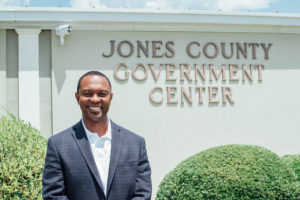How Would Jesus Save? Teaching Financial Literacy in the Bible Belt
“Give a man a fish and he will eat for a day. Teach a man to fish and you will feed him for a lifetime.” That’s the parable undergirding the JACOR Foundation’s financial literacy lessons available to residents of Jones County, Georgia, part of the African American South.

Both youth and adults are participating in financial literacy workshops. Reaching parents and children is crucial. “It will take the entire family to work together to become financially fit,” says Jonathan Pitts, longtime resident of Jones County and chairman of the JACOR Foundation, which has assisted families with food, clothing, rent, and utilities and began focusing on financial literacy education in 2021. In the past two years, the group has held five workshops and about 50 people have attended.
Pitts’ interest in this area runs deep. “My parents will tell you I have always been a saver. My wife and kids characterize me as being thrifty. But overall, I have always been interested in money management.”
Local banks, the chamber of commerce, churches, the school district, and financial donors are supporting JACOR’s effort. The Jones County Board of Commissioners has proclaimed April to be Financial Literacy Month in the county. Financial Literacy Month has been marked nationally since April 2004.
According to the latest MRI-Simmons consumer survey from fall 2021, 16% of Americans overall have money in a money market account, 25% have money in a 401(k), 5% in a 403(b), and 5% in a 529 college savings plan. African American South communities tend to be much less likely than average to have money in these accounts. Below is the breakdown by community type.
Establishing Accounts for Students
Educating students and incentivizing saving behavior are at the forefront of JACOR’s work. Thanks to the Jones County School District's College and Career Academy, the team taught lessons about accounting, banking, estate planning, homeownership, investing, and insurance at the high school in 2021. Students participated in an essay contest based on their learnings and were awarded prizes.
A Path2College savings account plan can be established with $25. JACOR partnered with TIAA CREF and Path2College to offer every Jones County Pre-K student an initial $25 to establish their personal college savings account.
“We have also helped kids participating in a youth ministry establish savings accounts and Path2 College accounts. We deposited $25 into each account as seed money with the hope they will continue to save and watch their accounts grow,” Pitts says.
Closing Gaps
Pitts sees financial literacy helping to close the racial wealth gap over the long term. “Being that financial literacy is not taught enough in schools nor homes, generations lack financial knowledge affecting their decision-making skills when it comes to money. Because of poor budgeting and spending practices, people pay higher interest rates on cars and homes from a lower credit score. A low credit score can make or break a family when it comes to money. By taking steps to improve their credit score, they can add hundreds of dollars in their budget, and establish a strong credit history."
Corrinne Fournier, a homemaker and homeschooling mom to eight children ages 1 to 13, remembers taking the workshop a year ago. She got a lot out of the sessions and at times brought three of her children who found them eye-opening, she says. Fournier, who manages her family’s finances, says, “The class reconfirmed my desire to not use credit and to make wise decisions with the money you have currently. Plan for accidents, plan for life. It was a good reminder, sometimes you get abundance; down the road things might be tight. If you do things properly, you’re not as affected when things are tight.”
Fournier put those lessons to work right away. During the time she was attending sessions, she invested in a piece of land. Then, her baby had to have surgery and the provider didn’t accept insurance. “We had to pay cash for her surgery. Right around the time, I cancelled this real estate purchase. It turned out to be a bad investment.” She says she lost the deposit. “Then we ran into medical bill after medical bill to help [my baby]. It drained our savings, but we were able to cover it. We didn’t have to go to the community, church, or our parents,” Fournier says.
For Debra Daniel-Purnell, a community volunteer who’s retired, the workshop taught her that it’s best to learn early in life how to manage your money — and she’s taking that to heart. “I’m trying to instill in my grandchildren the importance of money management.” Now Daniel-Purnell focuses on having a budget and writing down what she spends on. “It’s looking at what you spent and realizing that maybe you didn’t need those things,” she says.
The link has been made between one's location and personal finance hardships. The Washington Post’s article “Why the South has such low credit scores” pegs medical debt as a major factor of low credit scores in the South. The average FICO score for individuals in Jones County, Georgia, was 726 to 734 as of 2019. The highest U.S. county averages ranged from 751 to 774. In Jones County, medical debt stood at 16.7% in 2022; the typical amount in collections was $865, according to the Urban Institute. The article notes that Georgia is one of 11 states nationwide and one of eight states in the South that did not expand Medicaid under the Affordable Care Act.
Embedding Christian Principles
JACOR is guided by and leverages Christian principles, part of daily life and work in Jones County. “We are in the Bible Belt of the South and a large percentage of people go to church and believe in God. From our research, the Bible refers to money and possessions over 2,000 times, money and possessions are the second most referenced topics in the Bible, and a large percentage of divorces are because of finances,” Pitts says. "Therefore, it's significant to learn how God wants us to manage his resources because he owns it all. (The earth belongs to God! Everything in all the world is his! Psalms 24:1.) To live a true Christian lifestyle, we need to know and implement those principles so that we can experience true financial freedom, as we allow God to fully completely use our time, talent, and resources to fulfill his purpose for our lives."
As such, a Christian mindset pervades the lessons. “We have used Crown Financial Ministries Money Map and other materials, which are biblically based,” Pitts says.
Expansion plans are in the works, according to Pitts. “JACOR would like to expand this initiative throughout our region by partnering with like-minded organizations that understand the importance of financial literacy and teaching sound financial principles. We are not teaching get-rich-quick schemes, just solid Christian truths.”
Making Mindset Shifts
Residents do need to change their relationship to money, Pitts says.
First, delaying gratification is essential. “We see it, we want it, we buy it, then we figure out how we're going to pay off the debt we have created later. On several occasions we charge items without an idea of how we're going to pay off the debt. With credit card interest rates at 15% to 20%, it's extremely difficult to get out of credit card debt,” Pitts says.
Second, residents must create a spending plan. “It's best to track your spending for 30 days to determine where your funds are going. Based on that information, you should be able to develop a spending plan,” Pitts explains.
What else is standing in the way? “Some people do not recognize the importance of learning good money management skills early. Too often, we take the ‘trial and error’ approach or learn as we go, which can be very costly and may require five to seven years to correct,” he says.
To that end, JACOR will host a weeklong summer camp in June for tweens and teens ages 11 to 18 at the Jones County Chamber of Commerce, where they will learn about earning, budgeting, credit, saving, economics, investing, stocks, and the rule of 72, which is used to estimate the number of years needed to double the invested money at a given annual rate of return.
